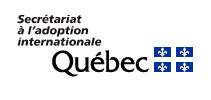Selection Criteria for Prospective Adopters
Criteria in Québec
According to Québec legislation, adopters must:
- be domiciled in Québec;
- be of full age;
- be at least 18 years older than the child they want to adopt.
The criteria of the child's country of origin are added to these.
Criteria of the country of origin
Countries of origin establish their own selection criteria for adopters.
Those criteria are established according to their laws and practices. They reflect:
- their culture;
- their customs;
- their spiritual values;
- their vision of the parent-child relationship.
Some countries have conditions regarding the age limit, conjugal status and socioeconomic situation of adopters. Criteria, such as the weight and health status of the adopters, are interpreted differently depending on the country's culture.
Countries that prohibit adoption
In Québec, it’s impossible to adopt children from countries that prohibit adoption, regardless of whether they are protected under kafala.
The psychosocial assessment: a required step
By law, any person who wants to adopt a child must first undergo a psychosocial assessment.
The psychosocial assessment enables the competent adoption authorities to determine the adopter's parenting capacity. It must emphasize the candidate's abilities so that the country of origin can make the best decisions when matching a child.
The adopter's participation in the psychosocial assessment process is crucial, as the assessment report is the main instrument for finding parents for a child.
To find out more about the psychosocial assessment, see the Psychosocial Assessment of the Adopters page.
